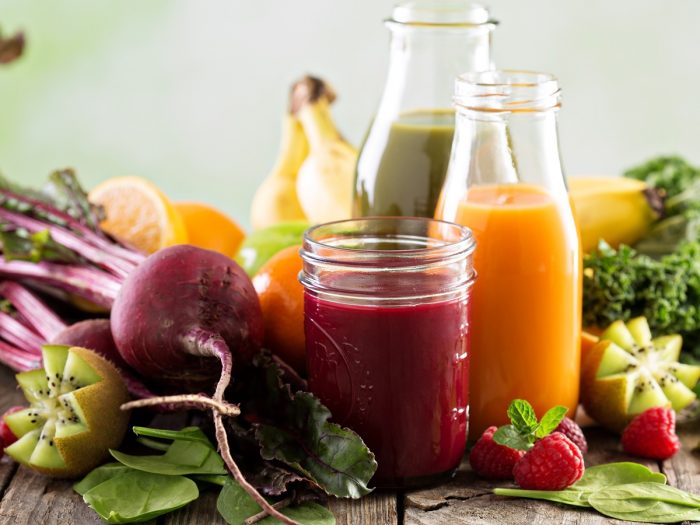Juice fasting has become a popular way for people to detoxify their body and lose weight, provided they do it in a healthy way and for a limited time. Juice fasting consists of cutting out all solid food for a period of time, replacing your entire food intake with various fruit and vegetable juices. Since fruits and vegetables contain high concentrations of nutrients and antioxidants, low levels of calories, and almost no fat, this can be an excellent way to get your health back on track.
Benefits of Juice Fasting
The top benefits of juice fasting include strengthening the immune system, losing weight, potentially reducing the risk of cancer, detoxifying the body, improving digestion and improving repair throughout the body.
Boosts Immune System
Many vegetable and fruit juices are rich in vitamin C, vitamin A, lycopene, beta-carotene, and an array of immune-boosting minerals. With your system flooded with these protective nutrients, many of which are antioxidants, your immune system will be able to better defend against infections and pathogens. [1]

Fruit juices satisfy, & boost your vitamin and mineral intake. Photo Credit: Shutterstock
Anticancer Potential
A study published in the Journal of Agricultural and Food Chemistry states that with numerous antioxidants in vegetables and fruits and removal of processed foods and artificial sugars, juice fasting may lower the impact of oxidative stress and reduce the risk cancer. [2]
Detoxifies the Body
With a pure liquid diet and the diuretic properties of many fruit and vegetable juices, this diet can flush out toxins from the kidney and liver and has been shown to reduce excess mucus in various areas of the body. [3]
Helps in Weight Loss
Juice fasting can aid in weight loss because you will be consuming fewer calories than an average diet, while also stimulating the metabolism and lowering cholesterol levels. However, juice fasting often causes a loss of water weight, which can return to a certain degree after the fast is over. [4]
Improves Digestion
By removing dietary fiber from your daily intake, you can allow your digestive system to rest and more efficiently absorb key nutrients and antioxidants during the course of the fast. [5]
What is Juice Fasting & How to do it?
Juice fasting means eliminating all solid food from your diet for an extended period of time, and only consuming vegetable and fruit juice. In most cases, this also means eliminating all of the dietary fiber from your diet, as a juicer will prevent any of those fibers from being included in the juice. Using a blender and straining your juice can have a similar effect. [6]
The best way to do a juice fast is to stock up on a variety of fruits and vegetables and clear out excess carbohydrates and snacks from your home. It may be easy to avoid making yourself a steak, but after a few days of a juice fast, a bag of potato chips may begin to look extremely tempting.
Most juice fasting diets urge you to consume 5-6 different juice mixes each day, some of which may be repeated. It is important to get as many essential nutrients as possible, which will require drinking different blends of fruits and vegetables, as each has a different nutrient profile.
Drinking 6-8 glasses of a single juice is quite boring, and will make it harder for you to succeed in your fast. Finally, certain fruits and vegetables are extremely high in certain nutrients, and there is always the danger of consuming too much of one nutrient (e.g., hyperkalemia – an excess of potassium).
How Safe is Juice Fasting?
There is significant debate about the safety of juice fasting since it is inherently reducing your intake of certain nutrients that a balanced diet would provide. By depriving the body of calories and protein, it is possible to weaken the immune system and losing muscle mass, while also leading to nutrient deficiencies if the juice fast isn’t done properly. [7]
While there are experts on both sides, claiming the benefits and dangers of juice fasting, they can all agree that diversity of vegetables and fruit is crucial, as is closely monitoring one’s calorie intake and nutrient balance. The duration of a juice fast is also a matter of intense debate.
How Long can you do Juice Fasting?
Most experts do not recommend juice fasting for more than 3 days, while others have praised the benefits of extended juice fasting – up to 3 weeks at a time! However, if you are depriving your body of dietary fiber, protein, fats, and calories for more than a few days – a week at the most – you are likely to start seeing negative effects.
You may experience dizziness or lightheadedness if your juices are primarily vegetable-based, as vegetables have fewer calories. A juice fast of more than 3 days may also result in exhaustion and muscle weakness, due to the low intake of protein.
Beyond 3 days, many people extend a juice diet, which means that most of your meals consist of juice, but a small meal at night, often rich in protein, rounds out the healthy day. Generally speaking, 3 days is the accepted limit for a pure juice fast, but depending on your present health condition, slightly longer juice fasts may be acceptable.
Juice Fasting Recipes
Some of the best ingredients for juice fasting can be spread across your meals for a balanced and delicious approach to juice fasting.
Morning: Celery, kale, green apple, lemon, lime, and ginger.
Afternoon: Papaya, pineapple, ginger, kiwi and coconut water.
Evening: Mango, blueberries, kale, lemon, avocado, flax seeds, and coconut water.
Happy Juicing!
